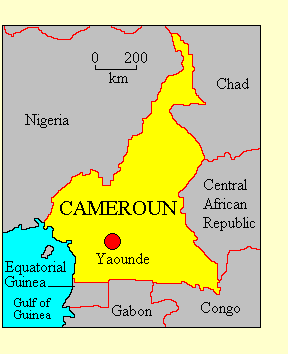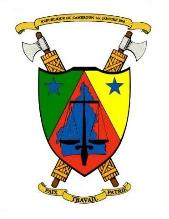

REPUBLIC OF CAMEROUN
• Official name: Republic of Cameroun / Republique de Cameroun
• Location: West Africa
• International organisations: African, Caribbean and Pacific Group of States, African Union,
Non-Aligned Movement, Organisation Internationale de la Francophonie,
Organisation of Islamic Conference, United Nations, World Trade Organisation
• Borders: Central African Republic, Chad, Congo (Democratic Republic),
Equatorial Guinea, Gabon, Nigeria
• Coastline: Bight of Biafra
• Land area: 475,440 Km2
• Population: 16,100,000
• Annual GDP (PPP) per capita: US$2,300 (2009 CIA estimate). World ranking: 147
• Ethnicity: Almost the entire population is of African stock, the largest groups being
the Bamileke-Bamoun (known as the Highlanders), the Fulani and other related peoples in the
north, and the Duala, Bulu and other Bantu peoples in the south.
• Languages: French and English are the official languages but French is dominant in
government and business. There are 24 major African languages spoken.
• Religion: Indigenous beliefs 40%, Catholic Christian 40%, Sunni Moslem 20%. The north is
mainly Moslem.
• Form of government: Presidential republic. Cameroun is divided into ten provinces
• Capital: Yaounde
• Constitution: The
Constitution of the Republic of Cameroun came into effect on 20 May 1972. It was
substantially amended in 1996.
• Head of state: The President, elected by direct universal suffrage for a seven-year term.
• Head of government: The Prime Minister, appointed by the President. The Prime Minister
is in theory accountable to the legislature but in practice is accountable to the President.
• Legislature: Cameroun has a unicameral legislature. The
Assemblee Nationale / National Assembly has
180 members, elected for five-year terms from single- and multi-member constituencies.
• Electoral authority: Elections are conducted by the
Observatoire National des Elections / National Elections
Observatory (This website has not been updated since 2004.) There is also a body called
Elections Cameroun or ELECAM (no website), which was created in 2006 as a supposedly independent
election commission. However eleven of its twelve board members are members of the
President's party.
• Freedom House 2011 rating: Political Rights 6, Civil Liberties 6
• Transparency International Corruption Index: 22% (146 of 178 countries rated)
• Reporters Without Borders Press Freedom 2010 Index: 55.7% (129 of 178 countries rated)
• Heritage Foundation Economic Freedom 2010 Index: 51.8% (136 of 179 countries rated)
Political history
The coastal region known as Cameroun was annexed by Germany in 1884. The territory was
occupied by the British and French in 1914, and later the League of Nations divided the
territory into the British Cameroons and French Cameroun as Mandated Territories. Pressure for
independence in the French territory began to grow in the 1950s, and France granted internal
self-government within the French Union in 1958, and full independence in 1960. The
southern part of the British Cameroons voted in 1961 to federate with Cameroun, while the
northern part voted to join Nigeria.

Ahmadou Ahidjo, the leading nationalist figure, became Prime Minister in 1958 and
President in 1960. In 1972 he turned Cameroun into a one-party state and abolished the
federal status of the former British Cameroons. Ahidjo remained in office until 1982 when he retired
and was succeeded by his Prime Minister, Paul Biya,
who has been President since. He is now 78.
In 1990 Biya reluctantly permitted the formation of political parties, after several
attempts to crush the growing movement for democracy. The first officially multiparty presidential and
legislative elections were held in 1992, but these were condemned by international observers
as rigged. Biya continues to rule in an authoritarian way, and the opposition boycotted
the 1997 presidential and legislative elections.
Biya should have faced re-election in 2002, but in 1998 he amended the Constitution
to extend his term until 2004. Legislative elections in 2002 were again boycotted by the
opposition. Biya was comfortably re-elected in 2004. Opposition parties contested the 2007
legislative elections (for which no figures have been published), but won only 27 seats
out of 180. Hostility to Biya's corrupt and authoritarian rule has fuelled a secessionist
movement in the territory of the former British Cameroons, which now suffers repression on top
of incompetent government.
President Biya's party, the Cameroun People's Democratic
Movement (RPDC), dominates national politics. Other parties are the
Social-Democratic Front, the National Union for
Democracy and Progress (UNDP) and the Democratic Union of Cameroun. In 2008 the National
Assembly amended the constitution to allow Biya to stand for re-election in 2011, and he was duly
re-elected with 78% of the vote.
Freedom House's 2011
report on
Cameroun says: "Cameroon is not an electoral democracy... A 2008 constitutional amendment removed the 1996
limit of two seven-year terms for the president, allowing President Paul Biya to run again in 2011. The president
is not required to consult the National Assembly, and the Supreme Court may review the constitutionality of a law
only at the president's request. Since 1992, the executive has initiated every bill passed by the legislature...
The National Elections Observatory (NEO) has little influence. An elections commission, Elections Cameroon (ELECAM),
was created in 2006, but commissioners were not named until December 2008. No civil society or opposition members were
included, and 11 of the 12 appointees were reputedly CPDM loyalists... Corruption remains endemic in Cameroon.
Biya's administration has encouraged cronyism, with members of the president's ethnic group dominating key positions...
The constitution guarantees free speech, but genuine freedom of expression remains elusive. Although the 1996
constitution ended prepublication censorship, the charter's Article 17 gives officials the power to ban newspapers
based on a claimed threat to public order... The requisite administrative authorization for public meetings is often
used to restrict freedoms of assembly and association... The judiciary is subordinate to the Ministry of Justice, and
the courts are weakened by political influence and corruption. Military tribunals exercise jurisdiction over civilians
in cases involving civil unrest or organized armed violence."
Updated November 2011
|

